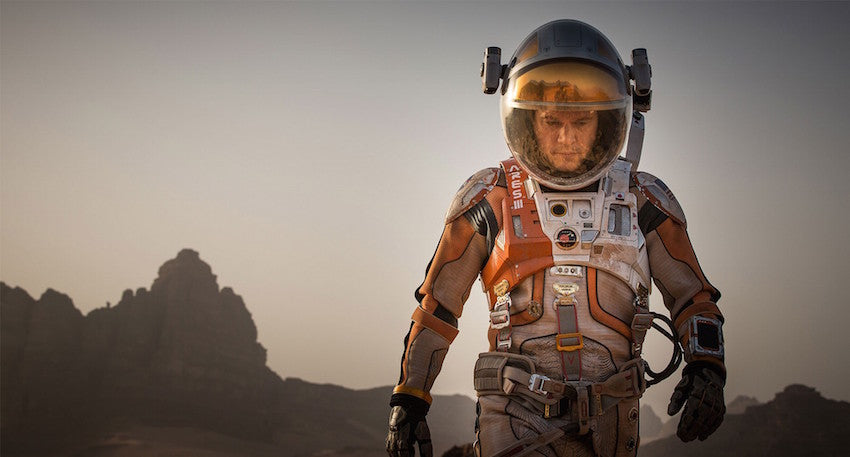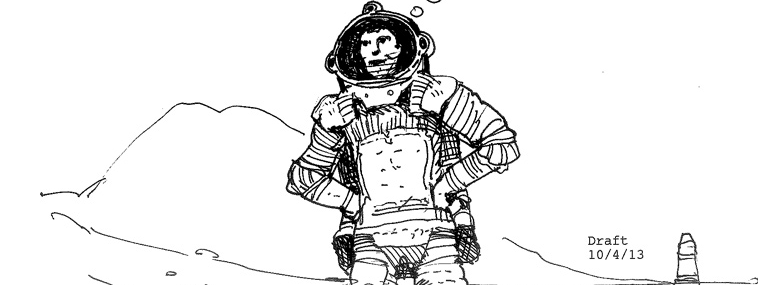5 Fast Facts About The Martian

It's possible that the recent discovery of water on Mars has amplified our already-rampant enthusiasm for Ridley Scott's The Martian, but we find ourselves champing at the bit to see the sci-fi luminary's latest effort, opening in the US on October 2nd.
Before you hit the theaters to see the saga of astronaut Mark Watney (Matt Damon) and his tale of survival against incredible odds, prime your viewing experience with these 5 fast facts about The Martian.
(Warning: minor spoilers ahead!)
1. The Martian is based on a novel by a first-time author who originally published it for free.
The film version of The Martian was adapted from the debut novel of the same name by author Andy Weir, a computer programmer by trade who posted the story for free on his website.
After fans asked for a version to read on e-readers, Weir self-published The Martian on Amazon in September 2012 for only 99 cents, where it quickly became the best-selling science fiction title on the site. Three months and 35,000 Kindle copies sold later, the big-name studios, agents, and publishers came calling.
2. The science behind the story was meticulously researched.
When writing the story, Weir spent time studying NASA satellite images, calculating orbital paths, analyzing surface conditions on Mars, and researching plausible methods to grow crops on the planet to get the science behind the story right. He'd also double-check his facts with his readers (many of whom are "science geeks"), then make adjustments as needed.
Once production for the film got underway, director Ridley Scott enlisted the help of NASA to up the film's scientific credibility. Soon, NASA's film and television liaison Bert Ulrich, director of the Planetary Science Division James L. Green, and others provided the production team with unprecedented support.
Several NASA departments joined in to field hundreds of questions from Scott's team and provided the film crew with copious amounts of images and details to portray the most realistic depiction of a space mission as possible.
3. ...but it's not entirely accurate.
While the science behind The Martian was intensely researched, some liberties were taken for the sake of Hollywood drama. Namely, the film's inciting incident — a windstorm on Mars that separates Watney from his crewmates, causing them to leave him behind — could never conceivably happen as it's written in the story.
According to Green, the density of Mars' atmosphere is only a fraction of Earth's, so the wind on Mars couldn't generate enough force "to straighten an American flag." So why the windstorm as the catalyst, then? For Weir, the answer is simple: "I thought [it] would be pretty cool."

4. The Martian has actually been in space.
Believe it or not, a part of The Martian has actually seen time in orbit. Ulrich came up with the idea to launch a piece of the script into space and sure enough, it did: the cover page of writer Drew Goddard's original adapted screenplay was one of several artifacts inside NASA's Orion MPCV (multi-purpose crew vehicle) as it embarked on its first test flight on December 5, 2014.
Orion's maiden voyage was an appropriate choice, as the NASA spacecraft is intended to help facilitate manned missions to Mars in the near future.
The cover page also features a drawing by Ridley Scott of the film's protagonist, Mark Watney, with what's sure to be one of the most memorable (albeit slightly profane) lines in the film.
Check out the full version of Scott's artistic stylings over at Empire.
5. Despite his vast sci-fi pedigree, Ridley Scott was intimidated by the script.
With perennial sci-fi classics like Blade Runner and Alien under his belt, one would think that Ridley Scott would be in his element with The Martian. Not so, according to the director himself.
In an interview with Space.com, the celebrated genre filmmaker admitted that because science was never his strong suit, the nature of the script scared him. "I was disastrous at mathematics, algebra, trigonometry and geometry — anything academic, in fact," said Scott.
Instead, he relied on his art training, sketching out detailed storyboards to help take The Martian from script to screen.
Check out the trailer for The Martian below, and let us know if you'll be heading out to see it in the comments:
Find QMx on: